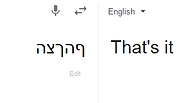
Giving a new meaning to bad translation
Stop talking gibberish or just stop talking
Inexplicably, Google translates random strings of Hebrew letters, essentially gibberish, into coherent English words, sentences and phrases.
Giving a new meaning to bad translations, Google Translate can now translate gibberish written in Hebrew alphabet into English words and phrases that make complete sense.
Typing a random string of Hebrew letters into Google Translate produces sentences in English that may not be gibberish, but of course have no connection to the meaningless Hebrew input.
For example, typing the letters "עכשדג" would produce the translation "A clock," while typing "ךםך חודא שדלןמע" comes up with "You are a fool." And, for some reason, "יעכיע" is translated into "Yes."
In some cases, however, it appears the translation algorithm simply assumes the gibberish is a typo and offers a translation of what it thinks the user meant. For example, "סהדרכ" is translated as "total," under the assumption the user intended to type "סה"כ," a Hebrew acronym for "in total."
It is possible the Hebrew-gibberish-to-English translation is a glitch in Google's translation algorithms, or perhaps an internal joke created by Google, which was just waiting to be discovered.
Google has yet to respond to requests for comment on the matter.
Google recently introduced a change to its translation algorithms, which significantly improved the quality of English-to-Hebrew translation, mostly for long texts and complete sentences.














